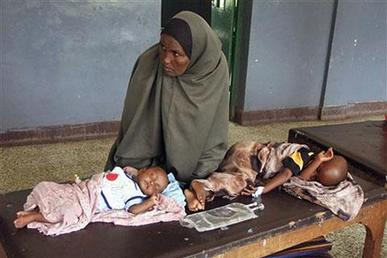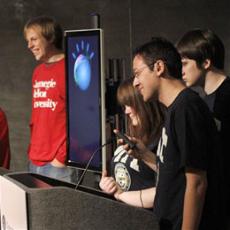
SHIRLEY GRIFFITH: This is SCIENCE IN THE NEWS, in VOA Special English. I'm Shirley Griffith.
BOB DOUGHTY: And I'm Bob Doughty. Today, we examine the extremely dry conditions in parts of East Africa. We also tell about a powerful computer getting a new job. And we tell about a link between laughter and good health.
(MUSIC)
SHIRLEY GRIFFITH: The drought in the Horn of Africa has been called the worst in 60 years. Scientists say the dry weather is at least partly the result of an event half a world away.
The event is calledLa Ni?a, which means "little girl" in Spanish. A La Ni?a begins when waters become cooler than normal in the eastern Pacific Ocean near the equator. Changes in wind currents can then affect weather around the world. Another event, called an El Ni?o, happens when the waters become unusually warm.
La Ni?as and El Ni?os happen about every three to five years. The latest La Ni?a began in July of last year and ended in May. The conditions, however, can last for up to two years.
BOB DOUGHTY: Wassila Thiaw studies Africa for the Climate Prediction Center at the National Weather Service in the United States. With a La Ni?a, Mr Thiaw says the easterly winds that are supposed to bring moisture into East Africa are reduced.
WASSILA THIAW: "There was less moisture coming into East Africa and therefore rainfall is reduced."
BOB DOUGHTY: Starting late last year, rains that were supposed to fall over Somalia, southern Ethiopia and northern Kenya failed. That part of the Horn of Africa has a second rainy season from March through May. Mr Thiaw says that one failed, too, but for different reasons.
WASSILA THAW: "What played out here during the March-April-May season we don't think that is really La Ni?a. But it [is] probably mostly due to the atmospheric conditions that prevailed during that time."
BOB DOUGHTY: Mr Thiaw says La Ni?a conditions might begin again by the end of this year. And if that happens, he says, then the October-through-December rainy season could again be dryer than normal.
SHIRLEY GRIFFITH: Climate researcher Simon Mason at Columbia University in New York says East Africa has been getting drier over about the last 10 years. Mr Mason says this is at least partly the result of global warming. Rising temperatures in the Indian Ocean create conditions that pull moisture away from East Africa.
Claudia Ringler at the International Food Policy Research Institute also points to another issue. She said by Skype that much of the land in the drought-affected areas is not very productive even in good times.
CLAUDIA RINGLER: "It will not get any better. Even if we have a bit more rainfall, the general potential for more food production is not expected to improve dramatically in the region."
SHIRLEY GRIFFITH: In the United States, the latest La Ni?a pushed moisture away from the south, causing severe droughts. Texas has suffered billions of dollars in agricultural losses. Changes in the winds pushed the rain toward the northern states, causing floods.
(MUSIC)
BOB DOUGHTY: It appears that Watson will soon get a real job -- in medicine. Watson is best known for appearing on an American television program. Watson, however, is not a person. He, or it, is a very powerful computer.
The International Business Machines Corporation, or IBM, created Watson. The company worked for six years to make a computer that could understand the human voice. IBM researchers hoped that it could hear a question and answer it very quickly.

IBM tested Watson's ability last February on the television game show "Jeopardy." The computer competed against two very intelligent humans. Watson won by answering the most questions about many subjects. But that was just for fun. Now IBM wants to put Watson to work on more serious things.
Watson's "brain" or computer memory is made up of ten electronic devices. Each is about the size of a home refrigerator. Computer scientists have filled Watson's brain with millions and millions of facts. Lately they have been giving Watson information about medicine and human diseases.
SHIRLEY GRIFFITH: WellPoint is a large health insurance provider in the United States. Thirty-four million people use it to help pay for their medical costs. WellPoint and IBM plan to use Watson to help doctors find what disease a patient might have, and then suggest a treatment.
When a patient goes to a doctor, he or she explains what the problem is. Watson might be listening to the patient through an electronic device in the doctor's office. Within seconds, the computer can search two hundred million pages of data, and then suggest what treatment the patient needs. Watson can also say that it has found more than one disease that might be responsible for the problem. And the computer can also explain how it reached that finding.
BOB DOUGHTY: One of the most difficult things the scientists at IBM needed to "teach" Watson was how to understand the human voice. Some people speak in a loud voice. Others speak softly. Some people speak quickly or do not talk clearly. Watson also needed to know the difference between two words that sound alike.
For example, a patient might say, "I heard the dog bark, and then it bit me." Or she might say, "I hurt my hand when it hit the bark on a tree." IBM says Watson will know the difference when it starts the new job early next year. After that, scientists hope to use Watson to help fix public safety issues, and even use its "brain" to work on complex banking or financial questions.
If you are wondering why the computer has the name Watson, you need to understand just a small, historical fact. IBM was formed in 1924 by a man named Thomas J. Watson.
(MUSIC)
SHIRLEY GRIFFITH: This is fine. [Laughs]
And so is this. [Laughs]
BOB DOUGHTY: This is better. [Laughs]
SHIRLEY GRIFFITH: But this -- this is excellent! [Laughs]
You have probably always known it. Laughter is good for you. Poets have said, "Laughter is the sun that drives winter from the human face." "Laugh and the world laughs with you." And, finally, "Laughter is the best medicine."

BOB DOUGHTY: Scientists in England now think they have evidence that a great, big, long laugh does good things to your body.
Robin Dunbar is an evolutionary psychologist at Oxford University. His study about laughter was published in the Proceedings of the Royal Society of Biological Sciences.
SHIRLEY GRIFFITH: Professor Dunbar tested volunteers to see how their bodies reacted to funny things, and to some nice, but not necessarily funny things. The professor showed videos to his subjects. At first, they watched things like sporting events. Then they were shown 15 minutes of really funny things, like television programs designed to make people laugh really loud.
After the programs ended, Robin Dunbar tested the volunteers to see how they reacted to pain. He put ice on a person's arm to see how long they could take the extreme cold. Some had their arms squeezed -- tighter and tighter. And some were asked to use exercise equipment that made them move faster and faster.
BOB DOUGHTY: Professor Dunbar found that the people who had laughed loudly and long could take up to 10 percent more pain than the others. He thinks that when we have really big laughs -- some call them belly laughs -- our brains release chemicals calledendorphins. Endorphins not only make us feel good, but they also help reduce pain.
The way the subjects laughed was important. Small laughs -- giggles -- or a simple "ha, ha, ha" had little effect. Big belly laughs, however, caused a greater release of endorphins and much greater pain relief. Scientists think that the greatest amount of endorphins are released when laughing causes our stomach muscles to move a lot. When this happens, people often say, "I can't stop laughing. It almost hurts!"
SHIRLEY GRIFFITH: Professor Dunbar also believes that laughter was important for our early ancestors thousands of years ago. He calls it an "early mechanism to bond social groups." He thinks that laughter helped people to form larger and larger groups.
When ancient humans got together, they ate, danced, sang and laughed. The professor thinks people have not changed that much when it comes to laughing. We all like to be around others who laugh, and who can make us laugh. John may be intelligent. Sue may be nice. But Caty is always a lot of fun!
So if Mr Dunbar is correct, our bodies will feel less pain, and we will feel better if we just laugh! By the way, have you heard the joke about the hurricane and the chicken? It was so windy, the chicken laid the same egg twice! [Laughter]
(MUSIC)
BOB DOUGHTY: This SCIENCE IN THE NEWS was written by Jerilyn Watson and Jim Tedder. Our producer was June Simms. I'm Bob Doughty.
SHIRLEY GRIFFITH: And I'm Shirley Griffith. You can find transcripts, MP3s and podcasts of our programs at voaspecialenglish.com. And you can find us on Twitter and YouTube at VOA Learning English. Join us again next week for more news about science in Special English on the Voice of America.
La Ni?a: a cooling of the ocean surface off the western coast of South America, occurring periodically every 4 to 12 years and affecting Pacific and other weather patterns 拉尼娜現象
El Ni?o: a warming of the eastern tropical Pacific occurring every few years, which alters the weather pattern of the tropics 厄爾尼諾現象(一種氣象現象)
endorphins: any of a group of peptide hormones that bind to opiate receptors and are found mainly in the brain 內啡肽;安多芬(體內的一種自然鎮痛藥)
Drought threatens Turkana way of life in Kenya
Experts link East Africa drought to La Nina in the Pacific
Warnings of Horn drought came early
Experts: La Ni?a, climate change impact East African drought
(來源:VOA 編輯:Rosy)
